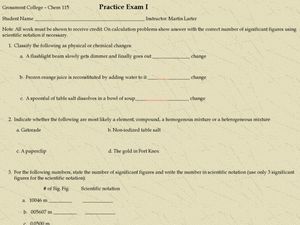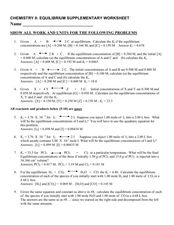Chemistry Collective
Virtual Lab: Strong Acid and Base Problems
Strong acids and bases don't hesitate to dissociate! Your chemistry class won't hesitate calculating pH either, thanks to an engaging simulation. Individuals perform a series of pH determinations on paper, then use the virtual lab to...
Curated OER
Cosmic Chemistry: An Elemental Question
Space scientists investigate the cosmic phenomena in order to search for answers to possible origins of the solar system. They consider the concepts of elements and isotopes. Data is analyzed looking at tje abundance of elements...
Beyond Benign
Enthalpy of Combustion
Learn the facts about types of wax! Partnered pupils determine the enthalpy of combustion for traditional paraffin candles, as well as soy-based candles. The activity focuses on calculations and compares the environmental impact of both...
Beyond Benign
E-Factor: Environmental Impact Factor
Explore how chemical processes reduce production waste. The 19th lesson in a 24-part series has learners explore the impact of green chemistry techniques on waste in production scenarios. They consider petrochemicals, bulk chemicals,...
Curated OER
Review of Stoichiometry
In this chemistry worksheet, students answer 50 multiple choice questions on stoichiometric calculations, the mole and chemical reactions.
Curated OER
Acids and Bases
In this chemistry instructional activity, learners answer 50 multiple questions on acids and bases. They calculate the pH and pOH of acid and bases solutions.
Math Worksheets Land
Patterns of Association (Using Data Table) - Matching Worksheet
This resource is the last of a four-part series that practices calculating percents based on data represetned in tables. This page has four multiple choice problems that analyze the data tables to answer a question.
Curated OER
Ka and Kb Calculations
In this solutions worksheet, students calculate the pH of given solutions or calculate the Ka or Kb for chemical compounds. This worksheet has 11 problems to solve.
Curated OER
pH and pOH Calculations
In this acids and bases activity, students calculate the pH or pOH of given amounts of different chemical compounds. This activity has 13 problems to solve.
Curated OER
Chemistry Basics Practice Exam
In this chemistry practice worksheet, students solve sixteen problems including identifying chemical and physical changes, calculating numbers with significant figures, naming compounds and writing formulas and converting from one unit...
Curated OER
AP Chemistry Chapter 9
In this AP Chemistry instructional activity, students apply concepts of electron configuration to accurately answer the questions provided. Students also draw Lewis structures of the given elements. Students estimate the enthalpy of...
Curated OER
Calculating the Average Mass of the Newly Discovered Element: Bean
Students determine the average mass of a new element using masses from three isotopes. In this chemistry lesson, students explain what an isotope is. They discuss their importance and uses.
Curated OER
Strong Acids and Bases
A straight-forward exercise awaits your chemistry charges. Two pages provide plenty of room for them to calculate the pH of five solutions, determine the number of hydrogen and hydroxide ions, and solve problems dealing with solutions....
Virginia Department of Education
Acid-Base Theory
Litmus paper, why so blue? A chemistry instructional activity includes a pre-lab activity, practice calculating pH, an experiment measuring the pH in acids and bases, a titration demonstration, and a titration experiment.
Science Geek
The Mole
What can you call a tooth in a glass of water? A one-molar solution! Presentation covers moles, Avogadro's Number, calculating formula mass, converting moles to grams, converting grams to moles, and calculations with moles. It is...
Virginia Department of Education
Solution Concentrations
What happens when you combine 6.022 times 10 to the 23 piles of dirt into one? You make a mountain out of a mole hill. Scholars use dehydration to obtain percent composition and then calculate the molarity of the original...
Virginia Department of Education
Partial Pressure
At some point, everyone has been under pressure—even Dalton! Explore Dalton's law of partial pressures with young chemists as they measure the volume of air extracted from a sample compared to its original volume. Class...
Curated OER
Relative Mass Formula, Atomic Formula, and Empirical Formula
After giving the definitions of the different compound terms and formulas, equations are provided to teach your chemists to calculate different values. Relative formula mass, atomic mass, and empirical mass are shown and explained with...
Curated OER
Minerals and Rock Cycle Review
In this minerals and rocks worksheet, students answer questions about the chemistry of minerals, scratch tests, rocks and the rock cycle, and erosion and deposition.
Royal Society of Chemistry
Mass Concentration of Solutions
Ready to teach your class about molar mass and solution concentration? Make time for an interactive resource that will challenge their reasoning and problem-solving skills. Science scholars calculate the molarity of several solutions...
Virginia Department of Education
Molar Volume of a Gas
What is a chemist's favorite plant? Stoichiome Tree! Scholars produce hydrogen gas by reacting magnesium with hydrochloric acid. Then they calculate the molar volume of the gas produced before answering assessment questions.
Pingry School
Determination of the Molar Mass of an Unknown Acid
Acids and bases have a love-hate relationship. They balance each other so nicely, but they are complete opposites! Learners use these concepts and titration to calculate the molar mass of an unknown substance. The experiment...
Curated OER
Unit Conversions
In this unit conversions activity, students calculate and convert measurements from one unit to another. They complete 109 short answer and problem solving questions involving unit conversions.
Curated OER
Equilibrium Supplementary Worksheet
In this equilibrium worksheet, students calculate the equilibrium constant and concentration to answer 13 problems. They predict the shift of the reaction when certain species are added.























